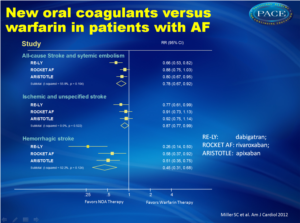New oral anticoagulants vs warfarin in patients with AF
08/05/2012
This meta-analysis examined the long-term efficacy and safety of the new oral anticoagulants compared to warfarin in preventing stroke and systemic embolism in patients with atrial fibrillation.
Meta-Analysis of Efficacy and Safety of New Oral Anticoagulants (Dabigatran, Rivaroxaban, Apixaban) Versus Warfarin in Patients With Atrial Fibrillation.Literature - Miller SC et al. Am J Cardiol 2012
Miller CS, Grandi SM, Shimony A, Filion KB, Eisenberg MJ.
Am J Cardiol. 2012 Apr 24. [Epub ahead of print]
Background
The long-term use of new oral anticoagulants has been evaluated in 3 large phase III randomized controlled trials, the Apixaban for Reduction of Stroke and Other Thromboembolic Events in Atrial Fibrillation (ARISTOTLE) trial,[1] the Randomized Evaluation of Long-Term Anticoagulation Therapy (RELY) trial,[2] and the Rivaroxaban Once Daily Oral Direct Factor Xa Inhibition Compared With Vitamin K Antagonism for Prevention of Stroke and Embolism Trial in Atrial Fibrillation (ROCKET AF)[3]. This meta-analysis examined the long-term efficacy and safety of the new oral anticoagulants compared to warfarin in preventing stroke and systemic embolism in patients with atrial fibrillation.
Main results
- The new oral anticoagulants were found to be at least noninferior to warfarin for the composite end point of stroke (including hemorrhagic stroke) and systemic embolism (22% RR reduction).
- All 3 drugs were associated with a significantly decreased risk for hemorrhagic stroke compared to warfarin (fig. 1, 55% RR reduction).
- Dabigatran and rivaroxaban were found to have comparable risks for major bleeding to warfarin, while apixaban demonstrated superiority for this outcome; gastrointestinal bleedings were heterogenous.
- The new oral anticoagulants were each associated with a decreased risk for intracranial bleeding compared to warfarin (51% RR reduction).
Conclusion
The new oral anticoagulants are more efficacious than warfarin in preventing stroke and systemic embolism in patients with AF, with a favourable decreased risk of intracranial bleeding.References
1. Granger CB, Alexander JH, et al. Apixaban versus warfarin in patients with atrial fibrillation. N Engl J Med 2011;365:981–992.2. Connolly SJ, Ezekowitz MD, et al. Dabigatran versus warfarin in patients with atrial fibrillation. N Engl J Med 2009;361:1139 –1151.
3. Patel MR, Mahaffey KW, et al. Rivaroxaban versus warfarin in nonvalvular atrial fibrillation. N Engl J Med 2011; 365:883– 891.

